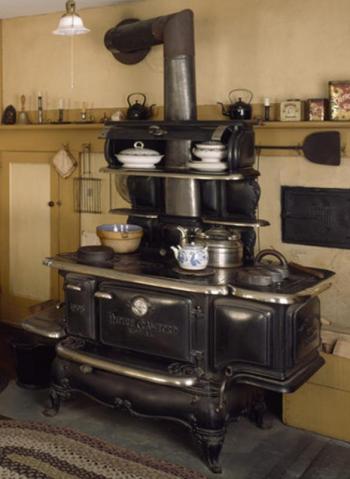Memories come alive at Castle Tucker
Six years ago, my husband Matt and I packed up a moving van and left our native Midwest to start anew in Boston.
Almost every summer since, my parents have come to visit and I shift into full “tour guide” mode. As a kid our family vacationed frequently, including an outing to at least one history museum. Over the course of several summers, we relived Abraham Lincoln’s life from cradle to grave.
Now that I have taken charge of planning the history lessons during their Boston visits, together we’ve explored everything from the American Revolution to the Kennedy presidency. These trips and tours have taught me more than I expected. I’ve learned not just about Tea Parties and Camelot, but about the story of my own family.
What struck me the most was that my relatively young dad could relate directly with a century-old cast iron stove.
Last summer, we took a short trip to Wiscasset, where I was excited to share Historic New England’s two properties, the Nickels-Sortwell House and Castle Tucker. Castle Tucker is a special place to me because it was the first of our 36 properties for which I conducted in-depth research.
I took my parents on an abbreviated tour through the house, deviating a bit from the standard tour to share with them things I had learned. I knew they would enjoy the Victorian parlor, billiard room and bedrooms, but I didn’t expect the kitchen to grab their attention.
We had no sooner entered the room when my dad caught sight of the 1906 cast-iron stove. “I remember those,” he said. “My grandmothers had them.”
Dad also remembered cleaning out the ashes that were spread over the garden for fertilizer.
My parents were born in the early 1950s, but their families had fewer modern conveniences than other families of that time. My dad still has family in the woods of northern Wisconsin, and as a kid, his aunts, uncles and grandparents maintained a lifestyle that resembled previous generations more than it did his.
The stove at Castle Tucker also reminded Dad of the wonderful food that his grandmothers made using those stoves. Sugar cookies, ginger cookies, bacon and scrambled eggs, and homemade preserves. “I remember especially Grandma Fronek making raspberry jam from raspberries Grandpa would pick in the woods.”
As a kid, I too had enjoyed juice and preserves from the Fronek farm. One of my earliest memories is going up to northern Wisconsin to visit my great-grandparents, and the things I remember most were the homemade juice and the pig pen (probably because my dad joked, “That is where you’re sleeping tonight”).
For me, this lesson about the Castle Tucker stove resonated on many levels. As a museum professional, it was wonderful to see a visitor connect with an object in such a pure way. Even though this particular stove was in coastal Maine, it was able to transport him to rural Wisconsin. But more importantly, it was a special personal moment. Not just because I saw my dad get excited about something that was part of my professional life, but because I saw how the object encouraged him to open up and share stories I never heard.
I feel like I’ve gotten to know my dad in a much different way in the years since we moved across the country. It is often at places like Castle Tucker where the real story is not so much about the rich and famous, or even the people who lived in the sites you visit, but about learning something new about your own family’s history.





























